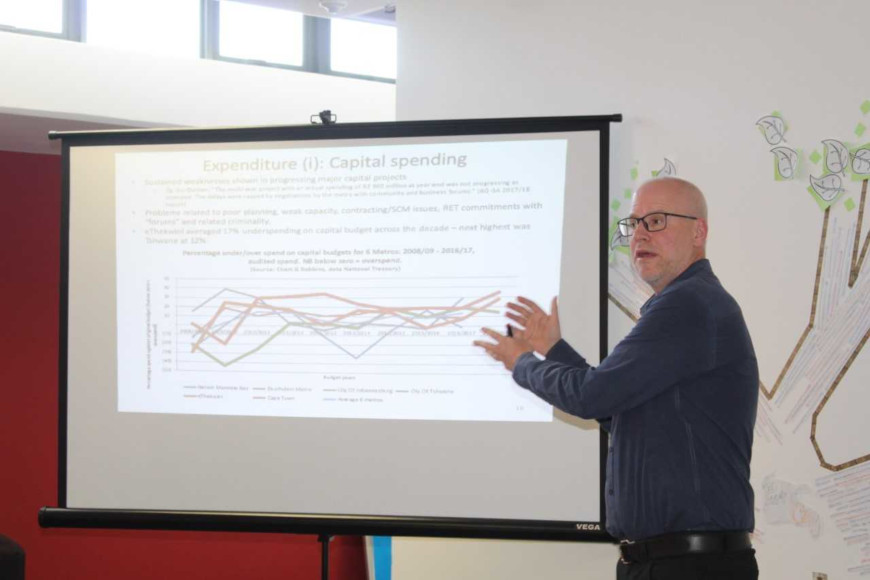The Durban University of Technology’s (DUT’s) Urban Futures Centre held a seminar presented by Glen Robbins, entitled: ‘Being bamboozled by budget billions? Selected insights from a comparative analysis of recent budgets of South Africa’s metros, with some reflections on the eThekwini Metro’. The seminar took place at the UFC Common Room on Wednesday, 14 August 2019.
With the municipality having recently adopted its budget for the 2019/2020 year, Robbins’ presentation explored more about various challenges through the lens of budget-related research. His work drew on previous work, done by the presenter, in exploring trends in South Africa’s metropolitan city budgets as well as preliminary results from a more recent project, with Liza Cirolia of the African Centre for Cities (University of Cape Town), on municipal fiscal trends in the City of Cape Town.
He added that South Africa’s local government model was a decentralised system of local government, a system based to a degree, by concepts of ‘subsidiary’: the principle that a central authority should have a subsidiary function, performing only those tasks which cannot be performed at a more local level.
“Local government should have its own sphere in terms of the constitution with constitutionally defined roles, local government be democratically elected, and able to develop its own budget and spending plans. Also, have authority to manage expenditure,” he said.
Robins said that metros account for 70 per cent of personal income tax revenue, but receive only 31 per cent of local government transfers. He gave more insight into the workings and challenges faced by municipalities such as the eThekwini municipality, in comparison to other municipalities in and around South Africa.
“KZN has the second highest population but, by some margin the higher number of public sector staff of any province. The consequence of this alongside poor planning and management, has seen a sustained erosion of KZN provincial capital spending and a loss of service quality,” he stressed.
However, according to the eThekwini Annual Report 2017/2018, there has been a significant increase in the overall performance of the municipality in the last four years. Although the municipality was challenged by external forces of interruptions of service delivery by business forums and service delivery protests, significant interventions were implemented in order to ensure service delivery performance.
In conclusion, he added that the question one needs to ask is whether the municipality is making sustained progress all the time, as in terms of relating financial information, as eThekwini ranks either fifth or sixth, in relying information to the public.
To read more on the eThekwini 2019/2020 Medium Term Revenue and Expenditure Framework (budget) can be found at this link http://www.durban.gov.za/Resource_Centre/reports/Pages/default.aspx.
Additional background material on metropolitan budgets in South Africa can be found at this link. http://www.sacities.net/thematic-areas/well-governed-cities.
Biography
Glen Robbins is an Honorary Research Fellow at the Urban Futures Centre of DUT. He works primarily on issues of urban and regional economic development. From 1995 to 2003 he worked for the eThekwini Metro following a brief stint doing contract work for a few national government departments. He has an MPhil in Development Studies (University of Sussex) and continues to work as an advisor to a number of South African public sector bodies as well as multi-lateral organisations in the United Nations system. He is also a Research Associate at PRISM in the School of Economics, University of Cape Town and serves as a director and/or voluntary advisor with a number of NGOs. He has authored and co-authored chapters in a number of books and contributed journal articles on a wide range of issues. His current research activities include: factors influencing the evolution of metropolitan budgets in South Africa, national economic policies and their impact on cities, human settlements, changing productive dynamics in Tanzania and the value chains of energy transitions in South Africa.


